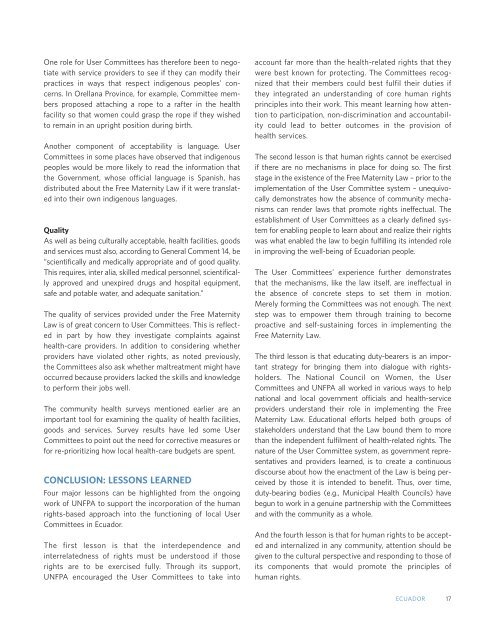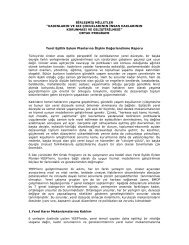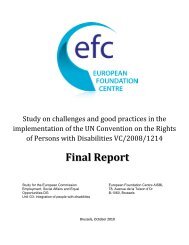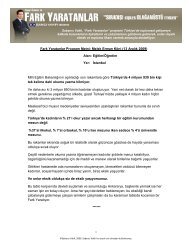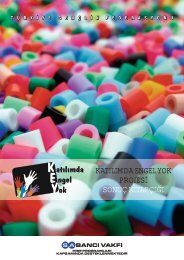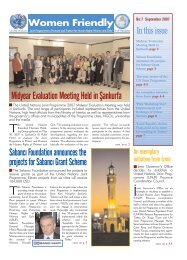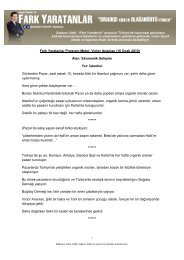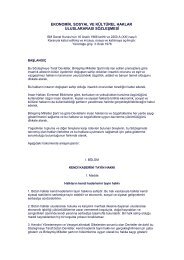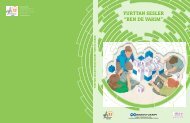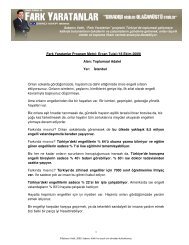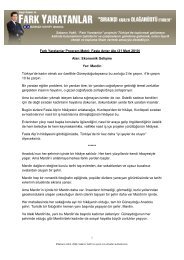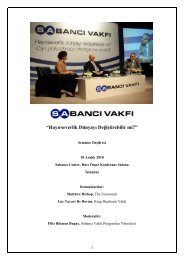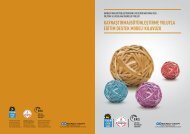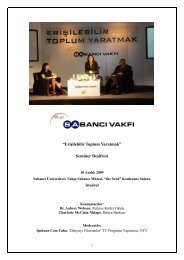UNFPA at Work: Six Human Rights Case Studies
UNFPA at Work: Six Human Rights Case Studies
UNFPA at Work: Six Human Rights Case Studies
- No tags were found...
You also want an ePaper? Increase the reach of your titles
YUMPU automatically turns print PDFs into web optimized ePapers that Google loves.
One role for User Committees has therefore been to negoti<strong>at</strong>ewith service providers to see if they can modify theirpractices in ways th<strong>at</strong> respect indigenous peoples’ concerns.In Orellana Province, for example, Committee membersproposed <strong>at</strong>taching a rope to a rafter in the healthfacility so th<strong>at</strong> women could grasp the rope if they wishedto remain in an upright position during birth.Another component of acceptability is language. UserCommittees in some places have observed th<strong>at</strong> indigenouspeoples would be more likely to read the inform<strong>at</strong>ion th<strong>at</strong>the Government, whose official language is Spanish, hasdistributed about the Free M<strong>at</strong>ernity Law if it were transl<strong>at</strong>edinto their own indigenous languages.QualityAs well as being culturally acceptable, health facilities, goodsand services must also, according to General Comment 14, be“scientifically and medically appropri<strong>at</strong>e and of good quality.This requires, inter alia, skilled medical personnel, scientificallyapproved and unexpired drugs and hospital equipment,safe and potable w<strong>at</strong>er, and adequ<strong>at</strong>e sanit<strong>at</strong>ion.”The quality of services provided under the Free M<strong>at</strong>ernityLaw is of gre<strong>at</strong> concern to User Committees. This is reflectedin part by how they investig<strong>at</strong>e complaints againsthealth-care providers. In addition to considering whetherproviders have viol<strong>at</strong>ed other rights, as noted previously,the Committees also ask whether maltre<strong>at</strong>ment might haveoccurred because providers lacked the skills and knowledgeto perform their jobs well.The community health surveys mentioned earlier are animportant tool for examining the quality of health facilities,goods and services. Survey results have led some UserCommittees to point out the need for corrective measures orfor re-prioritizing how local health-care budgets are spent.CONCLUSION: LESSONS LEARNEDFour major lessons can be highlighted from the ongoingwork of <strong>UNFPA</strong> to support the incorpor<strong>at</strong>ion of the humanrights-based approach into the functioning of local UserCommittees in Ecuador.The first lesson is th<strong>at</strong> the interdependence andinterrel<strong>at</strong>edness of rights must be understood if thoserights are to be exercised fully. Through its support,<strong>UNFPA</strong> encouraged the User Committees to take intoaccount far more than the health-rel<strong>at</strong>ed rights th<strong>at</strong> theywere best known for protecting. The Committees recognizedth<strong>at</strong> their members could best fulfil their duties ifthey integr<strong>at</strong>ed an understanding of core human rightsprinciples into their work. This meant learning how <strong>at</strong>tentionto particip<strong>at</strong>ion, non-discrimin<strong>at</strong>ion and accountabilitycould lead to better outcomes in the provision ofhealth services.The second lesson is th<strong>at</strong> human rights cannot be exercisedif there are no mechanisms in place for doing so. The firststage in the existence of the Free M<strong>at</strong>ernity Law – prior to theimplement<strong>at</strong>ion of the User Committee system – unequivocallydemonstr<strong>at</strong>es how the absence of community mechanismscan render laws th<strong>at</strong> promote rights ineffectual. Theestablishment of User Committees as a clearly defined systemfor enabling people to learn about and realize their rightswas wh<strong>at</strong> enabled the law to begin fulfilling its intended rolein improving the well-being of Ecuadorian people.The User Committees’ experience further demonstr<strong>at</strong>esth<strong>at</strong> the mechanisms, like the law itself, are ineffectual inthe absence of concrete steps to set them in motion.Merely forming the Committees was not enough. The nextstep was to empower them through training to becomeproactive and self-sustaining forces in implementing theFree M<strong>at</strong>ernity Law.The third lesson is th<strong>at</strong> educ<strong>at</strong>ing duty-bearers is an importantstr<strong>at</strong>egy for bringing them into dialogue with rightsholders.The N<strong>at</strong>ional Council on Women, the UserCommittees and <strong>UNFPA</strong> all worked in various ways to helpn<strong>at</strong>ional and local government officials and health-serviceproviders understand their role in implementing the FreeM<strong>at</strong>ernity Law. Educ<strong>at</strong>ional efforts helped both groups ofstakeholders understand th<strong>at</strong> the Law bound them to morethan the independent fulfilment of health-rel<strong>at</strong>ed rights. Then<strong>at</strong>ure of the User Committee system, as government represent<strong>at</strong>ivesand providers learned, is to cre<strong>at</strong>e a continuousdiscourse about how the enactment of the Law is being perceivedby those it is intended to benefit. Thus, over time,duty-bearing bodies (e.g., Municipal Health Councils) havebegun to work in a genuine partnership with the Committeesand with the community as a whole.And the fourth lesson is th<strong>at</strong> for human rights to be acceptedand internalized in any community, <strong>at</strong>tention should begiven to the cultural perspective and responding to those ofits components th<strong>at</strong> would promote the principles ofhuman rights.ECUADOR17


